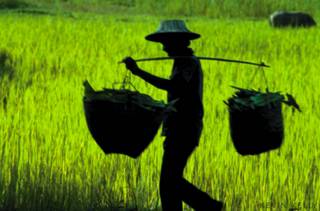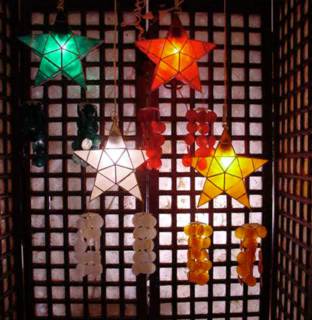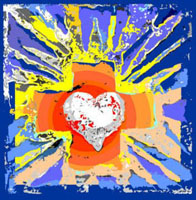HERE'S THE SCORE By Teodoro C. Benigno
The Philippine Star 12/31/2004
For a nation as down as we are, a nation the whole world seems to have forgotten, our only survival kit as we enter the year 2005 is the fabled Filipino smile. Maybe we see less of this smile as the current year ends. Maybe a pall of hopelessness is beginning to spread. Maybe Christmas this year wasn’t what it used to be, the never-ending deluge of greetings, the table always managing to be copious and hospitable. Now we’re down to our legendary smile.
And yet even as we smile, it cannot conceal the ache behind, the pain behind, the growing fear we’re hurtling against a brick wall, and then the lights go out, the smile goes out.
I remember having pointed out once in this space that we Filipinos are going through an unprecedented period. Like the melting watches of Salvador Dali, his pendants, his figures of women, our political, economic and social landscape is beginning to dissolve. And as they melt, what alternative landscape or landscapes are in store?
We’re still edgy, hesitant, perhaps even fearful talking about change. Change, radical and sudden change knocks fitfully at our intellectual doors. Any talk about revolution or civil war still brings off epileptic fits of objection and strong ideological opposition. Bloody change, puneta no, let’s reform the system, it’s not yet too late. That’s what I hear most often. With the addendum, we can still make our democracy work.
Maybe the wisdom of one Washington Sycip can refloat the waters of intelligent and rational discussion. He said: "There’s no country in the world that started with democracy and widespread poverty together and progressed to prosperity. None." He was right. And everybody in the room fell silent, not one able to rebut.
The Philippines had both. Democracy and a deeply impoverished people.
Wise in the ways of history, the never-ending cycles of change, great nations arising and great nations ebbing, weak nations stirring and weak nations throbbing to greatness, Wash nonetheless implied that our system, coupling democracy to grinding poverty could never work. Never did work. Never will work.
I wish Mr. Sycip could tell that to President Gloria Macapagal-Arroyo, to her advisers, to all those who cling to power and slam the door at any suggestion it’s time the Philippines shifts to strongman rule, an authoritarian system or benevolent dictatorship.
The coming year 2005 will tell whether we Filipinos have finally arrived at that historical stage where we can pull a political gun at the face of the powers that be and impose the change we desperately need to survive as a nation. The period for debate on what’s wrong with us is over and done with. We know what’s wrong. What we don’t know is what to do next
We have all stopped pretending there’s gold in them dar hills if only we cared to work and reform, and shed off all our bad habits. We can only get to the gold in them dar hills if we change systems, seek and impose models that will work in Asia. The Western democratic model has never worked in Asia. And never will.
Japan, South Korea, China, Malaysia, Singapore, Taiwan, Thailand and now Vietnam knew that. And so they forged political, economic and social systems that set up a command structure which cracked an almost merciless whip. The command was to catch up with America and the West, catch up in the shortest time possible, catch up by fully harnessing science and technology, catch up by slashing populations that could eat only crumbs so they could eat three square meals a today, catch up by putting the nation to work, work, work, sacrifice, sacrifice, sacrifice.
When the president of a country is haplessly reduced to begging her soldiers to stand by her and protect her because of a rising tide of popular anger and disgust, then you know the country is already kaput. I am not even sure those soldiers will oblige. They too and their families are twisting in the squalls of poverty. The time will certainly come when they will down rifles and abandon their masters in Malacañang.
Will the year 2005 provide the political and social tsunami enabling the people to rise in a great sheet of water and fall upon those who have persecuted them for ages?
Last Wednesday evening, we had ample occasion to discuss the year 2004 in terms of what it yielded and the year 2005 in terms of what it could yield. This was the Dios at Bayan talk show of Brother Eddie Villlaneueva aided by Kata Inocencio at Zoe Channel 11. Guests were journalists Tony Lopez and myself.
Tony in the beginning tried to give 2004 a pretty fair face but in the end succumbed to the dark wellsprings inside him and painted the passing year in the starkest hues. With all the graft and corruption, with the visage of Maj. Gen. Carlos Garcia sticking out of the tent like a disemboweled donkey, there was nothing to relieve 2004 except the pugilistic feats of Many Pacquiao.
The May 10 elections, earlier accepted as passable although somewhat defiled, in retrospect began to bulge like a grizzly particularly with the sudden death of Fernando Poe Jr.(FPJ). Nope, there was nothing good we could say about 2004. It was not only bad year. It was a horrible year.
Media got a beating during the show.
Brother Eddie complained that during the 26th aniversary of Jesus Is Lord where multitudes of the faithful filled the Luneta and speakers lambasted Malacañang, all the TV stations avoided it like the plague. Not a single line appeared in print media the following day Did they get instructions from on high? Were they – whisper, whisper – taken care of?
Throughout the TV show, the bad news about 2004 tumbled out like garbage into the dump yard. The nation’s leadership was berated, the thieves flagellated, the illegal loggers, the smugglers, the Bureau of Customs, Jose Pidal of course. It was like pasturing a herd of wild, dirty pigs through the corral.
Kata Inocencio womanfully tried to light a candle in all this darkness, but all she could accept – like the rest of us – was Manny Pacquiao. Well, biddie boy, live up to all the expectations and, by Jove, you’ll really make a huge pile of money and make it honestly. Go to it, beat Marquez, break the skull of Barrera again.
And the year 2005, how would it register?
It would not only be more of the same. It could or would be worse, much worse. The rise in the prices of prime commodities, of everything, would not be stopped. For GMA, it would be like sticking a finger into a hole in a dike that was breaking down.
And so? And so, we all hemmed and hawed. We were getting into what is normally uncharted territory, or No Man’s Land. Yes, yes, yes, everything could be worse. I said what nobody wanted to say. I said it was possible the"social volcanlo" could erupt in the year 2005. But short of that, we avoided getting into the currents of "civil war?" or revolution or coup d’etat.
I heard the word junta. I pretended not to hear it. Brother Eddie, as host, was treading a trip wire. Kata Inocencio was not willing either to tip the talk show into a seething cauldron of coups and national bloodletting. Tony Lopez figured there was a line in the ground to be respected. Maybe in the next Wednesday talk show of Dios at Bayan, we could essay some shadow-boxing on the subject.
In the meantime, we were still feeling the effects of 2004. And the possible beginnings of 2005.
Oh yes, we discussed the Filipino and his culture. What was it about him that resisted progress, that could take a crushing left hook on the jaw without sprawling on the canvas? What was about the Filipino that was complacent and patient, resigned and forbearing, submissive, easy to forget, easy to forgive?
And yet the Pinoy was fleeing the Philippines in droves. Brother Eddie mentioned the earlier figure of about two to three thousand Filipinos departing daily for distant lands. Now the figure had bloated to six or seven thousand. It was deplorable, it was sad. What could we do to stop it?
Nothing really. There were no jobs to hand out. Food had become scarce, and classrooms depleted. Pray? Yes, the Filipino was good at that. He could dance, he could sing, and yes indeed, he could pray very well. And looking at how tsunamis devastated South Asia and killed close to a million, he was praying even more. And somewhat still smiling.















